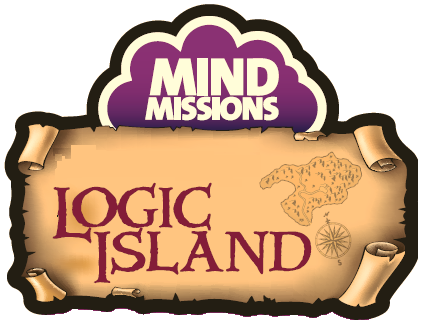Theories and teachers notes for Mind Missions workshops
The Mind Missions Logic Island programmes have been designed to encourage your students how to work effectively as a team.
Unlike our other programmes, the Mind Missions programmes are based around one detailed scenario. Your students effectively take on the role of characters within a story who must successfully complete a series of tasks in order to complete their mission.
Nathan Bolt is an explorer who is stranded on Logic Island. In order to escape from the island, he has to go through a number of tests and tasks, collecting information along the way which he will be able to use, in order to find the key that will enable him to get off the island. All the time, a giant clock is ticking down and the students know that they must complete the tasks before the clock reaches zero.
In order to complete each challenge, the students will need to do two things. The first is to really focus on the information which is been put in front of them. They will need to pay attention not only to the instructions that are in front of them, but also to each other, understanding how to share ideas effectively and stay aware of what's going on around them.
Are you really listening?
As teachers, no matter what Key Stage you are teaching, you will probably experience the almost universal issue of your students only tending to listen to part of the instructions that you give them. They often switch off half way through and fill in the blanks themselves.
Some years ago, we were told a story by a teacher about a valuable lesson she taught her students.
The students came into their maths lesson and found on their desks what appeared to be a planned maths test. The students looks absolutely horrified as they contemplated this nightmare for which they had not revised. The teacher simply told them to sit down and follow the instructions that were in front of them.
At the top of the page the first instruction read as follows:
"Before attempting any of these questions, first read the entire question paper."
The first few questions in the test were made up of a difficult set of maths questions. The students looked absolutely horrified and very quickly began frantically making notes. However, question seven read as follows:
"This is not a real test. Put your pen down right now, turn your test paper over, take out a book and do silent reading until told otherwise."
Astonishingly, only one student out of the 30 in the class got to the end of the allocated time for the test having taken out their book. Only one of them actually engaged with the instructions fully.
The teacher created the fake test to demonstrate to the students that they have a tendency to listen to or read the first half of a set of instructions and then fill in the blanks themselves.
In this case the students realised that they had had needlessly put themselves through the unnecessary stress of the test, for which they believed they forgotten to revise.
The lesson turned out to be a very valuable one for those students and they started actually paying attention to what they were being told by their teacher.
The Mind Missions programmes will teach your students how to pay attention to the instructions which they have been given and follow them carefully. They will see the advantages of putting in the extra time and effort to achieve this.
Identifying the things that you're good at...
The Mind Missions programmes will help teach your students to identify their own skills, and use them effectively in conjunction with the skills of those around them. They will start to understand that we are all good at different things and that's fine. By working together and using our strengths with those of the others around us we can make amazing things happen.
Effective teamwork:
Finally, and perhaps most importantly, through the Mind Missions programmes, your students will start to understand the meaning of effective teamwork.
For some students, their initial interpretation of effective teamwork, is 'everybody doing it together'. They will quickly realise that just by taking part, doesn't mean you will achieve your goal. They will realise that effective teamwork involves identifying your goal, planning on how you going to reach that goal, and then putting that plan into action.
They will learn that it's not always about doing, sometimes it's about thinking; I t's not always about talking, sometimes it's about listening and it's not always about taking part, sometimes it's about watching and learning.
By the end of the program your students should have a renewed understanding of how they can use their skills effectively together with those of the people around them. They will understand what makes a good team, and a good team player.
It's valuable stuff, enhanced with the sense of achievement that comes from ensuring that Nathan Bolt escapes from Logic Island.